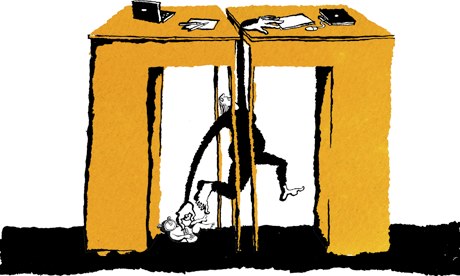Stefan Stern in The FT
To mark the recent centenary of the Harvard Business Review, editor-in-chief Adi Ignatius dipped into the archive and found, among other things, an article from 1956 titled “Successful Wives of Successful Executives”.
“It is the task of the wife to co-operate in working towards the goals set by her husband,” the article stated. “This means accepting — or perhaps encouraging — the business trips, the long hours at the office, and the household moves dictated by his business career.”
It got worse. The husband, the piece continued, “may meet someone who conforms more closely to the new social standards he has acquired while moving socially upward; he may discard his wife either by taking a new wife or by concentrating all his attention on his business.” Yuk.
The rise of the dual-career couple has transformed the politics of marriage since the 1950s but some tensions remain. A recently published book declares: “The most important career decision you’ll make is about whom to marry and what kind of relationship you will have.”
The words appear in “Money and Love: an Intelligent Road Map for Life’s Biggest Decisions”, written by Myra Strober, professor emerita at Stanford University, and Abby Davisson, a former executive at retailer Gap, and now a consultant.
The book takes a both/and rather than an either/or approach to the issues surrounding professional and domestic life. The authors reject an artificial notion of “balance”. Instead there are necessary, hard-headed but human trade-offs. “If you want lives that are not just two individuals pursuing career aspirations separately, then it takes a lot of negotiation and a lot of discussion, and compromise,” Davisson explained when I met the authors in London.
Strober led a course called “work and family” at Stanford’s graduate school of business (SGSB) for several decades until her retirement in 2018. She was one of the first female faculty members there on her appointment in the early 1970s.
“If I had proposed my course at the business school would be called ‘money and love’ instead of ‘work and family’ I would have had some pushback,” she told me. But wasn’t this in California in the days following the “summer of love”? “The business school was not buying that then either!” she noted.
Perhaps inevitably, in a book written by a business school professor and graduate, there is a checklist or framework to help the reader make better life decisions. These are the five Cs: to clarify what is important; to communicate effectively with a partner (or potential partner); to consider a broad range of choices, avoiding crude either/or decisions; to check-in with a sounding board of friends and family; and to explore the likely short-term and long-term consequences of any big decisions.
Actions will count as much as the thought processes that precede them.
Davisson said: “The mental models that we have, particularly from our parents, are incredibly powerful.” If you don’t see what an equal partnership looks like in your home, she added, it might be hard to imagine one.
“I have two boys,” she said, “and they see my husband as the head chef. They think it’s funny when I cook . . . They will have this model of us sharing the workload. All the home responsibilities do not fall on one person.”
During the Covid pandemic, employees, parents and carers had their roles blended as they worked from home and tried to keep family life going. For some that has been an opportunity to more equally share the domestic workload, for others it has made the mythical work/life balance harder to achieve.
The authors say more is needed. “We need to invest in excellent childcare,” Strober said. “This is something business leaders need to be thinking about.” Davisson added: “We see birth rates falling, people not wanting to fund the cost, and then we wonder why people are not having more children.”
Although Strober’s course was greatly valued by students — with men, incidentally, making up 40 per cent of participants — SGSB chose not to continue it after her retirement.
That risks the business school reverting to a too narrow focus on money and how to make it — without thinking about the human factor.
Strober is all too familiar with that split. She cites the 18th-century philosopher Adam Smith’s two books: The Wealth of Nations, which covers free markets and the workings of the economy; and The Theory of Moral Sentiments, which focuses on social cohesion and relationships.
“Most people only know about The Wealth of Nations,” said Strober. “It’s too bad that he separated out those two books. Had he blended the discussion of wealth with the discussion of altruism we might not be quite so separated on them.”
We need both money and love. “Having money isn’t worth it unless you also have love,” Davisson said. And Strober’s final piece of advice? “The trick is to find someone to be your life partner who has the same philosophy as you do.”
Claire Perry, Tory MP for Devizes and childhood guru to David Cameron, says she's had three careers: she's been a banker, a mother and a politician. It is brave of her – and not because bankers and politicians are the most despised professions around. Ms Perry is brave because she makes claims for motherhood that has too many feminists and members of the Coalition sneering: it is a full-time, unpaid job.
Perry is promoting "Mothers at Home Matter", a group that wants the Coalition to recognise the contribution of stay-at-home mothers. Their message is urgent: when the state has to step in to care for children, the tax payers end up paying millions in creches and programmes like SureStart – now recognised as a hugely expensive Labour failure.
Worse, psychologists are now worrying that being raised outside their home environment by a succession of "professionals" can scar children for life. In Sweden, where this is a matter of routine, school records show the highest truancy and "worst classroom disorder" in western Europe. The star witness for MAHM was Jonas Himmlestrand, expert in Swedish family policy, who reported that his homeland, where 90 per cent of children are in subsidised child care, has seen a serious decline in adolescent mental health, between 1986 -2002 declined faster than in 10 comparable European countries.
So, forget the Swedish model. MAHM believes the key to happy families is to change the tax system that right now forces women to work. The UK is almost alone amongst developed countries in not recognising family and spousal responsibilities in its tax system. The burden on the single earner has more than doubled in the last 50 years. Many single earner families are in the poorest third of the population. MAHM want families taxed on the basis of household rather than individual income. They call "for a debate about income-splitting, transferable tax allowances and protecting child benefit for parents with dependent children."
Politicians should pay attention: the number of mothers who stay at home is down to a third — but, as I found out when I researched "What Women Really Want" for the Centre for Policy Studies, the majority of mothers would like to stay at home to look after their children. That's quite a constituency, Messrs Cameron et al. Ignore it (and your pledge to introduce family tax credits) at your peril.


